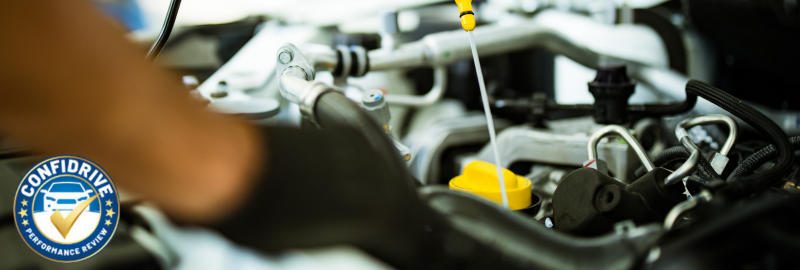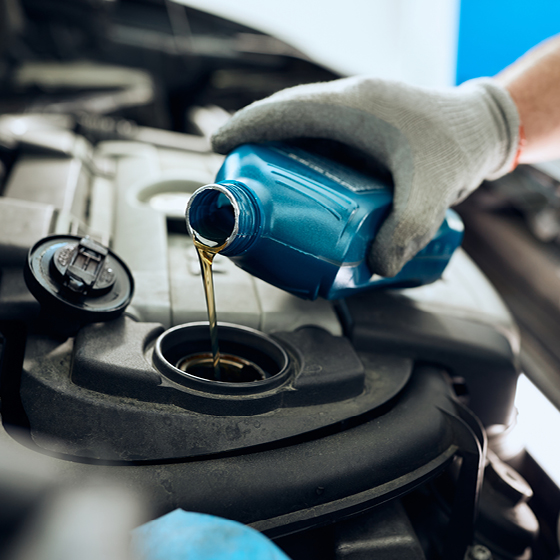
5 Reasons Your Car Struggles to Start in the Winter
Here are some common reasons your car might struggle when the temperature drops:
1. Battery Efficiency
During the hot summer months, car batteries can become strained from the heat. A power-drained, heat-damaged battery is often the culprit when your car won’t start once the winter weather returns. This is because in cold weather, your vehicle needs more power to crank. If your battery has low power, it’s harder to turn the engine over. In addition, the chemical reactions required to generate power slow down, leading to reduced efficiency. Plus, electrical resistance increases in the cold, impacting battery and spark plug efficiency. At 32°F, a car’s battery loses about 35% of its strength, and at 0°F, it loses 60%.
Battery Tip: Have your battery tested and replaced if necessary. Regular battery checks can save you time and money in the long run.
2. Fuel Line Freeze
Water vapor in your fuel line can freeze and create blockages, preventing fuel from reaching the engine.
Fuel Line Tip: Try higher grade fuels with lower ethanol content and additives containing methanal, like STP Gas Treatment and Heet gas-line antifreeze.
3. Oil Viscosity
Cold weather thickens essential fluids like oil, transmission fluid, and antifreeze. Thicker fluids flow less freely and potentially leading to blockages. This makes it more difficult for the engine to start.
Oil Tip: Keep up with regular oil changes. Use the winter-grade oil recommended in your owner’s manual for better flow at colder temperatures.
4. Spark Plug Problems
Old, worn out, or malfunctioning spark plugs may not ignite the fuel-air mixture in the engine, especially in colder conditions.
Spark Plug Tip: Have your spark plugs checked regularly and replaced based on the manufacturer’s scheduled maintenance recommendations. Faulty spark plugs should be replaced by a professional mechanic.
5. Alternator Issues
If your alternator is failing, it can’t charge the battery effectively. This leads to a lack of power when you start the engine.
Alternator Tip: Monitor the alternator and get it checked regularly, especially if your car shows signs of weak battery power.
What Should I Do if My Car Won’t Start in the Cold?
- “Cycle” the Key: In cold weather, you may need to warm up the battery and starter. Put the key in the ignition and turn it from “off” to “start” about ten times, waiting a minute between attempts if it doesn’t work after the first round.
- Jumpstart the Battery: If your car won’t start in the cold, the battery may be weak. A jumpstart with jumper cables might be necessary. Be sure to read your vehicle’s handbook before attempting and call a professional mechanic if you need help. After a successful jumpstart, it’s recommended that you get a battery check.
- Call Roadside Assistance: If the car doesn’t start in the winter cold even after trying the above methods, call for professional help.
- Winterize Your Car: Regular checks of the battery, tires, and essential fluids are crucial. Switching to snow tires can also be beneficial.
- Keep it Covered Overnight: Parking in a garage or under a cover is especially important in the winter. This will help keep the car’s fluids warmer.
- Warming Up the Engine Properly: In freezing weather, it’s important to warm up the engine. For newer models, idling for long periods is unnecessary. A brief 30-second idle followed by a gentle drive is sufficient for warming up most engine components.
How Mr. Tire Can Help
At Mr. Tire, we understand the challenges that winter brings to car owners. Our comprehensive car services address all these issues and more:
- Expert Maintenance and Repairs: Our skilled technicians offer battery testing, oil changes, and more to keep your car in peak condition.
- ConfiDrive Performance Review: At every visit, we offer a thorough multi-point vehicle inspection. Whether it’s an oil change, brake job, or new tires, our Technicians will carefully review your car’s components for functionality and safety.
- Winter-Ready Services: We provide specialized winter services to ensure your vehicle can handle the cold.
- Quality Parts and Equipment: We use high-quality parts for all repairs and replacements, ensuring reliability and efficiency.
-
Conclusion
Winter doesn’t have to spell trouble for your car. With the right knowledge and the expert services offered by Mr. Tire, you can keep your vehicle running reliably throughout the season. Whether it’s routine maintenance or more complex repairs, we are here to ensure your winter driving is safe and smooth.
Contact us today to schedule a service appointment or drop by your nearest Store location for personalized assistance and experience the peace of mind that comes with expert care.



